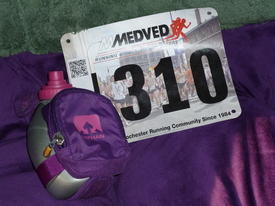Exercising close to max HR
Replies
-
Have you considered a ramp test? They are relatively inexpensive and will give you a lot of useful data.
I haven't.. but I will, thank you!0 -
My heart rate is very similar to yours - everyone has a different peak rate. I am healthy - low blood pressure, good cholesterol, 5'2, 100 lbs. I exercise everyday. My resting heart rate is in the 60s. I have a friend, in great shape, who has to work hard to get her heart rate to 150 - 150 is a comfortable jog for me - 180's when I am running fast. I adjust my heart rate monitor for peak heart rate - and so does she - we get the same caloric burn. I have no idea if this helps you out - but if you feel healthy & good don't worry. I freak out when my HRM reads zero!! lol
Thanks Freda! Appreciate it! 0
0 -
I've always had a high heart rate while running, even at longer distances (usually around 170 the whole way). This year, I've intentionally started trying to run with a lower heart rate (around 140). At first, I could only barely jog and my heart rate would get over that. I would have to take walking breaks. As I've kept at it, though, I've been able to go faster and faster without any increase in perceived effort. Today, I ran 6 miles in under 58 minutes (pushing a 35+ pound stroller) and my heart rate was 132 when I stopped. 6 months ago I couldn't have done that time at all with the stroller. Today I was never even out of breath. Obviously, I don't know you, so I don't know for sure, but it may be that your will power is stronger than your cardiovascular system.
Good call.. yeah I see what you're saying. I think I need to tone it down a bit and focus on working out with a lower HR and see if I can increase speed etc w/o increasing perceived effort. Apprecite your reply, thanks so much!0 -
No real answers, but I too am in the high HR boat. I use a Polar FT4 and consistently have a heart rate in the 170's when working out no problem. I get into the mid 180's for briefer periods, but don't last more than a couple minutes there. My true resting HR is 60-70's, but it jumps up over 100 quite easily. I'm a nurse, and honestly don't worry too much about it. I think as long as you can tolerate it and it returns to a lower rate easily with rest, not an issue!
Thanks for your response. I wondered about this too, since I get up to 175-185 on the elliptical if I push it, but my resting heart rate is 74. This makes me feel better. I don't stay there for very long, just a few minutes, and my heart rate comes down to 100-110 after a minute or so (if I'm sitting and not walking around). 0
I don't stay there for very long, just a few minutes, and my heart rate comes down to 100-110 after a minute or so (if I'm sitting and not walking around). 0 -
I don't go by the 220 formula. That means me and Lance Armstrong have the same max HR (minus any EPO / blood doping...allegedly). I have hit over 200 on climbs and lived. LOL.0
-
my resting heart rate is pretty low, 60-65... Now when I am doing Insanity or the Asylum each circuit will have my heart rate between 170-190... but it drops fast during the water breaks and stretches... :happy:0
-
I use heart rate to determine if I'm slacking. Particularly if I'm exercising while I'm tired or have a lot on my mind, I can really phone in my cardio. I don't care how high my heart rate goes, as long as it's above the target I set. If I go anaerobic, I will not need a HRM to tell me that.0
-
I play ice hockey, and wore my HRM at a couple games. MY HR peaks at 192 during games. According to the formula, my max hr should be 190. So my guess is the ice hockey gets me at or pretty close to peak.
It doesnt suprise me as ice hockey is 1 minute shift at high intensity (3-5 seconds of max effort sprinting, a few seconds of gliding, and a few seconds of skating at half speed, all intermingled) followed by 1-2 minutes of sitting.
I also read that heart attacks could be an issue among adult hockey players -- which given what I just described doesnt suprise me.
I thought about tailoring my cardio to more closely match what happens in hockey games, but then I realized its probably not a smart thing to get your HR up to max too often. So now I've decided to target 180 as a peak if I'm doing cardio.
Anyways, it might be safe to take it down a notch, or atleast not to be staying at the 190 level for too long
I read an article about it last week, but can't find it. These are a couple links that came up in a quick search:
http://www.prweb.com/releases/2011/9/prweb8808957.htm
http://hockey-university.com/archives/991
•23% of heart attack occur during exercise
•During high intensity bouts of exercise our chance of suffering a heart attack increases 100 times.
•During high intensity bouts of exercise our chance of suffering a fatal heart attack increases 50 times.0 -
I play ice hockey, and wore my HRM at a couple games. MY HR peaks at 192 during games. According to the formula, my max hr should be 190. So my guess is the ice hockey gets me at or pretty close to peak.
It doesnt suprise me as ice hockey is 1 minute shift at high intensity (3-5 seconds of max effort sprinting, a few seconds of gliding, and a few seconds of skating at half speed, all intermingled) followed by 1-2 minutes of sitting.
I also read that heart attacks could be an issue among adult hockey players -- which given what I just described doesnt suprise me.
I thought about tailoring my cardio to more closely match what happens in hockey games, but then I realized its probably not a smart thing to get your HR up to max too often. So now I've decided to target 180 as a peak if I'm doing cardio.
Anyways, it might be safe to take it down a notch, or atleast not to be staying at the 190 level for too long
I read an article about it last week, but can't find it. These are a couple links that came up in a quick search:
http://www.prweb.com/releases/2011/9/prweb8808957.htm
http://hockey-university.com/archives/991
•23% of heart attack occur during exercise
•During high intensity bouts of exercise our chance of suffering a heart attack increases 100 times.
•During high intensity bouts of exercise our chance of suffering a fatal heart attack increases 50 times.
Couple of things to keep in mind about the ideas you present.
1. Doing max-effort intervals in hockey is not the same thing at maintaining a high sustained effort for 2+ hours. I believe it is the extended time at effort that is the more significant factor rather than the effort itself.
2. There has always been an increased risk of injury during exercise and the risk increases as the effort increases. Anytime you put a load on the heart, there is an increased risk--if there are any underlying abnormalities or disease. Which leads to.......
3. The risk is most significant if there is an undetected underlying abnormality (e.g. Marfans, aortic stenosis, etc) or if there is underlying heart disease. A healthy individual (esp a young healthy individual) with no heart disease or structural abnormalities is likely at little risk from heart damage when engaging in higher-intensity effort.
4. There might be other related issues that could be a problem with max effort--e.g. asthma, hyperthermia, blood sugar--but these are not directly related to the max effort and would be more comparable to #2.0 -
Most of the time in people who have been exercising a while a high heart rate at a lower perceived effort is simply a sign of poor aerobic conditioning - not just a sign that everyone is different.. Usually that is because all the work has been done at a higher intensity - too high to properly and fully develop the aerobic system.0
-
I was glad to read this as well-I've been exercising since I was 18 (33 now), so I found it hard to believe that I am out of shape thus the higher HR. I also average about 160-175 during my usual cardio workouts (step, spinning, kickboxing) and I don't feel out of breath like I'm going to pass out. I use a Polar FT4. I saw my doctor a year ago for heart palpatations, was determined I was dehydrated. They had me wear a holter monitor (however you spell it) and everything came back fine. My blood pressure runs low-usually around 100/70 or lower. I always worried that I was slowly killing myself, glad to see I'm not the only one who "runs high".0
-
Most of the time in people who have been exercising a while a high heart rate at a lower perceived effort is simply a sign of poor aerobic conditioning - not just a sign that everyone is different.. Usually that is because all the work has been done at a higher intensity - too high to properly and fully develop the aerobic system.
With your love of LSD, I am convinced you are the reincarnation of either Timothy Leary or Ken Kesey...............:drinker:0 -
It is working though. My 5 mile pace at 70% HRR (HR=132) dropped 24 seconds per mile in the first two weeks of training this way. So I'll keep doing this until the improvements stop coming.Most of the time in people who have been exercising a while a high heart rate at a lower perceived effort is simply a sign of poor aerobic conditioning - not just a sign that everyone is different.. Usually that is because all the work has been done at a higher intensity - too high to properly and fully develop the aerobic system.
With your love of LSD, I am convinced you are the reincarnation of either Timothy Leary or Ken Kesey...............:drinker:0
This discussion has been closed.
Categories
- All Categories
- 1.4M Health, Wellness and Goals
- 398.2K Introduce Yourself
- 44.7K Getting Started
- 261K Health and Weight Loss
- 176.4K Food and Nutrition
- 47.7K Recipes
- 233K Fitness and Exercise
- 462 Sleep, Mindfulness and Overall Wellness
- 6.5K Goal: Maintaining Weight
- 8.7K Goal: Gaining Weight and Body Building
- 153.5K Motivation and Support
- 8.4K Challenges
- 1.4K Debate Club
- 96.5K Chit-Chat
- 2.6K Fun and Games
- 4.8K MyFitnessPal Information
- 12 News and Announcements
- 21 MyFitnessPal Academy
- 1.5K Feature Suggestions and Ideas
- 3.2K MyFitnessPal Tech Support Questions






